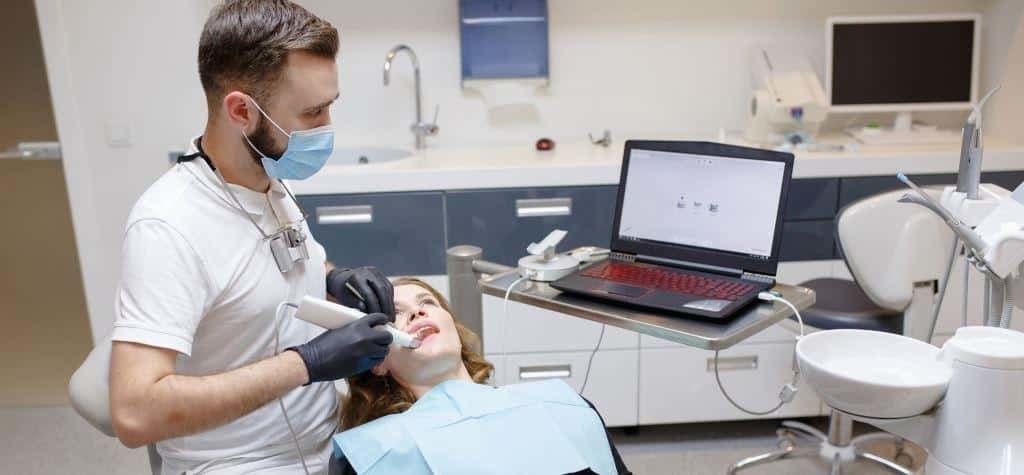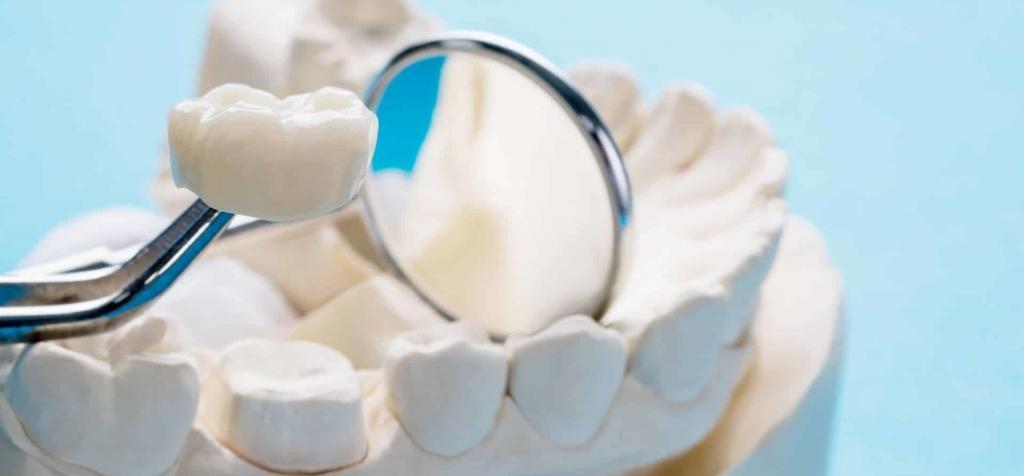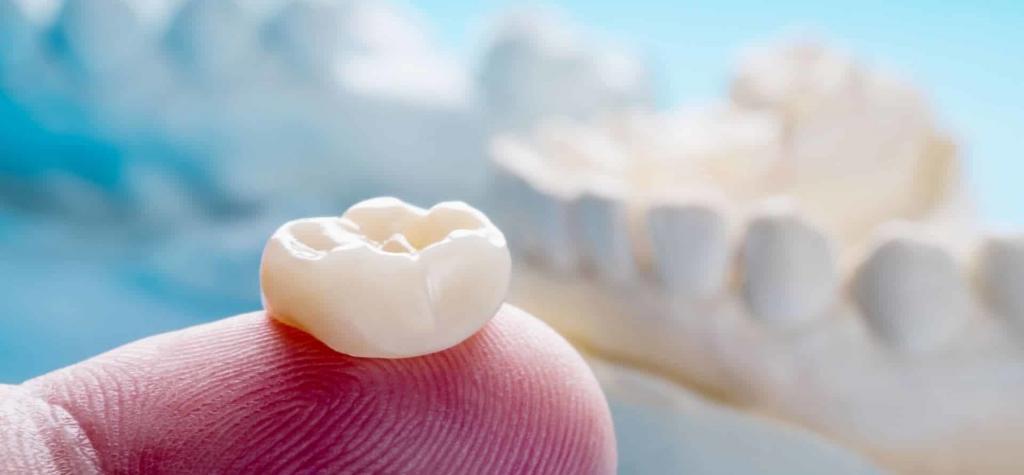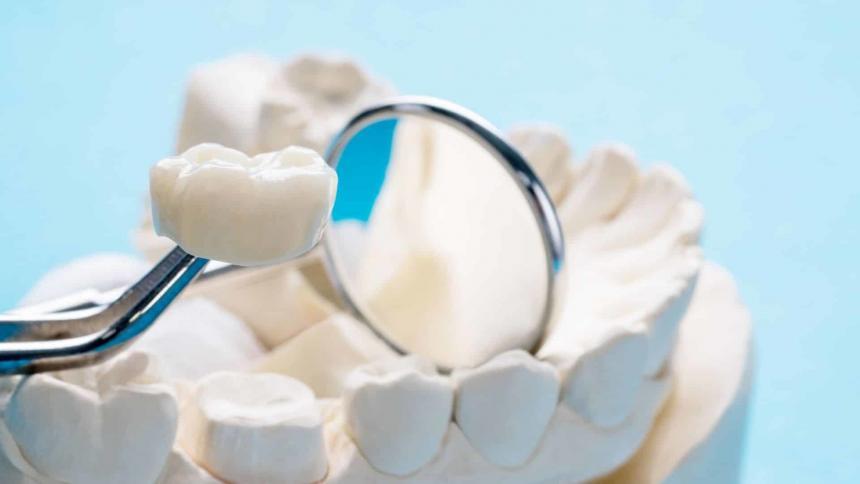Crowns are a great solution if you have a chipped or damaged tooth and another filling no longer makes sense. Firstly, it strengthens and covers the damaged tooth, and secondly, it significantly improves the aesthetics. We outline the key information about this prosthetic solution, how much it costs and what you can choose from when deciding on crowns for teeth in the UK.
Tooth crown is nothing more than a kind of cap that imitates a single tooth. With a wall of a few millimetres, it is possible not only to cover the tooth, but also to change its shape and colour. Unlike dentures, dental crowns are fitted permanently and a visit to the dentist is required to remove them.

When are dental crowns used in the UK?
In some situations a simple filling may not be enough, for example when a tooth is badly damaged by decay or is chipped or broken. Then crowns for teeth in the UK are the solution.
Large discoloured enamel and missing teeth are also indications for their use. They can also protect a tooth after root canal treatment, which is then weaker than the others.
Importantly, crowns can be used on both front and back teeth, and a well-made restoration is very durable and can last for many years.
Most often, crowns are placed on healthy teeth. Therefore, prior dental treatment is often required. The tooth is then ground down, followed by a temporary crown, and finally, based on an individual model, a permanent crown.
If the tooth is very damaged and it is not possible to place a crown on it, crown-root inlays or dental implants are used.
If you want to learn more about this topic be sure to read our text "Implants UK - everything you need to know" or contact get on with it.

The end of impressions, or what a scanner has to do with a crown
Once the tooth has healed, the next step before a permanent restoration is fitted is to create a crown based on a customised model.
Previously, patients who needed crowns or bridges had to expect a very unpleasant procedure. They had to bite into a large amount of special mass for several minutes, which caused considerable discomfort and, in many cases, even a vomiting reflex. This was necessary in order to prepare a plaster model on the basis of which crowns for teeth and bridges were made. This method was not only unpleasant for the patient, but also inaccurate.
Nowadays, thanks to the intraoral scanner, which is also equipped in our office, the entire procedure takes a few minutes. The dentist receives an almost instantaneous three-dimensional image of the condition of his patient's teeth, and the tooth crown prepared on the basis of this image is perfectly adapted.
If you are interested in modern technologies used in dentistry, take a peek at our article for more information on this topic - "Teeth under the microscope - modern technology in dentistry".
The final stage is the placement of the permanent crown.

Crowns for teeth in the UK - types
Depending on the dentist's recommendations, the crown can be:
- Partial, as the name suggests covers only part of the tooth
- Covering, whose function is primarily to shield the tooth
- Total, most commonly used, which covers the entire lost crown of a tooth
If you decide to have a crown made for your teeth in the UK you can choose from the many types available on the market. They are made from different materials and therefore vary in strength, aesthetic effect but also in price. Below are the most popular crowns for teeth in the UK.
And if you are interested in the prices of crowns in our office - have a look at our price list.
Zirconia crown
It is made on a zirconium oxide substructure (a superior ceramic material), which is then covered with a very thin layer of porcelain. This crown is not only durable, but also flexible, which prevents it from cracking. In addition, its colour can be almost perfectly matched to the natural shade of the patient's teeth.

Porcelain crown in the UK
They are most often fitted on a ceramic or metal substructure (recommended especially for posterior teeth). In the latter case, the metal, or more precisely the dental steel, is almost invisible as it is covered by a ceramic coating. In some cases, however, the metal may shine through in the cervical area, where the crown is thinnest. This problem does not arise with a porcelain crown on a ceramic substructure.
Temporary crown
Used during prosthetic treatment. Most often made of acrylic, it is intended to protect the tooth until a proper permanent crown is fitted.

If not crowns for teeth in the UK then what?
You can always replace a chipped or very damaged tooth with an implant. Although the result is very permanent and aesthetically pleasing, it is also much more expensive. That is why it is best to contact us. During your visit, together we will find the best solution for you that fits within your budget.
We would also like to remind you that you can spread your treatment at our practice in instalments with zero interest. You can find out more about this in our article "Teeth on credit: dental treatment on hire purchase". Importantly, our instalment system is 100% secure and regulated by the Financial Conduct Authority (FCA number 619628).
If you have problems with your enamel and teeth whitening does not have the desired effect, you can opt for veneers instead of crowns. We wrote about them in the article "Dental veneers in the UK. Everything you need to know".
And if you have additional questions - call us or make an appointment online with a prosthodontist in our practice.
We also invite you to follow us on Facebook.

